10 Health Benefits of Corn in Pregnancy
Corn in Pregnancy
Eating nutritious food throughout pregnancy is essential to safeguard the health of both mom and the baby. But pregnancy is also when food desires or cravings kick in and pregnant women find themselves longing to feed on Corn Kernels. But is it safe?
Overview
Corn is a popular cereal, which is rich in minerals and vitamins. It comprises of vitamin C, B1, B5, dietary fiber and magnesium. Corn is nutritious as well as very delicious. The juicy and crunchy taste of sweet corn is found to be appealing to many pregnant women.
Popular varieties of corn such as popcorn and sweetcorn are mostly consumed. Refined corn products such as corn flour, corn syrup, and corn oil are also consumed frequently as ingredients in processed foods like tortillas, polenta, cornmeal.
Whole-grain corn is as healthy as any other cereal grain, as it is rich in fiber, vitamins, minerals, and antioxidants.
Benefits of Corn
Some nutritional benefits of eating corn during pregnancy are:
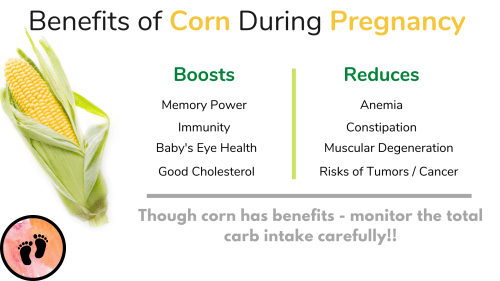 Health Benefits of Corn in Pregnancy
Health Benefits of Corn in Pregnancy1. Gives Relief from Constipation
Corn is an excellent source of dietary fiber and helps to ease digestive issues like constipation by retaining water.
2. Lessens the Risk of Neonatal Defects
Corn is a good source of folic acid, which reduces the risk of neural tube abnormalities in the unborn baby like Spina Bifida.

3. Increases Memory Power
Eating corn during pregnancy can also help boost memory. Corn is rich in thiamine Vitamin B1 which can promote the brain development of the fetus.
 Benefits of eating Corn during Pregnancy
Benefits of eating Corn during Pregnancy4. Prevents Muscular Degeneration
Consuming corn during pregnancy safeguards your baby from muscular deterioration after his birth as corn contains zeaxanthin. Zeaxanthin acts as a muscle protective.
5. Keeps the Baby’s Eyes Healthy
 Corn in pregnancy helps in Baby Eye Development
Corn in pregnancy helps in Baby Eye Development Corn has many antioxidants like lutein which play a role in improving the eyesight of your unborn baby.
6. Prevents Cancer
Reports suggest that the antioxidants present in corn can prevent the occurrence of some types of cancer including breast cancer.
Corn consists of phenolic compounds like ferulic acid, which can lower the risk of tumors.
7. Helps in Functioning of Organs
Corn is rich in pantothenic acid, Vit B5, which helps in overall functioning of organs.
8. Prevents Anemia
Corn is an excellent source of vitamin B12, which aids the formation of blood cells and helps to prevent anemia in pregnant women.
9. Boosts Immunity
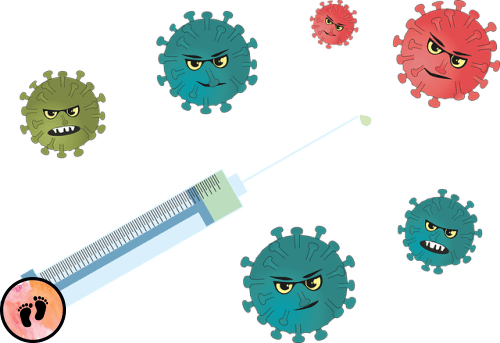 Corn in pregnancy helps in boosting Immunity
Corn in pregnancy helps in boosting ImmunityCorn is rich in vitamin A. Therefore, it keeps your skin healthy, promotes memory power and improves your immunity during pregnancy.
10. Increases Good Cholesterol
Intake of corn husk oil may promote the reduction of plasma LDL (bad cholesterol) and increase the presence of good cholesterol in the body.
Nutrition facts
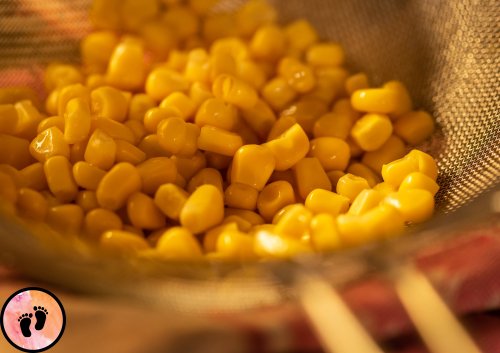 Boiled yellow sweet corn in pregnancy
Boiled yellow sweet corn in pregnancy1. Carbohydrates
Corn, like all other cereal grains, is primarily composed of carbs. The main carb consists of starch, comprising 28–80% of its dry weight. It also provides small amounts of sugar (1–3%).
However, sweet corn is a special, low-starch variety which is having higher sugar content, almost at 18% of the dry weight. Most of the sugar is sucrose. Despite the sugar in sweet corn, it ranks low or medium on the glycemic index (GI)
2. Fiber
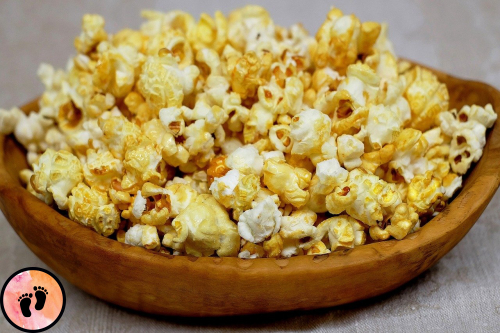 Corn in pregnancy - Popcorn is rich in fiber
Corn in pregnancy - Popcorn is rich in fiberCorn contains a fair amount of fiber. One medium bag (112 grams) of movie popcorn holds approximately 16 grams of fiber. This is approximately 42% and 64% of the Daily Value (DV) for men and women, respectively.
While the fiber content varies with different types of corn, it’s generally around 9–15% of the dry weight. The predominant fibers in corn are insoluble, such as hemicellulose, cellulose, and lignin.
3. Protein
Corn is a decent source of protein. The protein content ranges from 10–15% depending on the variety of corn.
A protein known as zeins are the most abundant in corns, accounting for 44–79% of the total protein content. Accounting to this, zeins have many industrial applications, as they are used in the production of adhesives, inks, and coatings for pills, candy, and nuts.
4. Vitamins and minerals
Corn may contain a considerable amount of several vitamins and minerals. Notably, the number of vitamins and minerals is highly variable depending on the corn type.
In general, popcorn is rich in minerals, whereas sweet corn is higher in many types of vitamins.
Side-Effects
The following are some side effects of eating corn during pregnancy:
Too much of anything is not good. Don't go on eating corns all-day.
- If you are diagnosed with any heart conditions, reduce corn intake as it contains fatty acids.
- It may cause indigestion; therefore, it is better to consume fresh corn in limited amounts.
Gluten intolerance is a common condition caused by an auto-immune response to gluten in wheat, rye, and barley.
Corn contains zein which are related to gluten and can show symptoms of gluten intolerance like
- Fatigue
- Bloating
- Weight loss
Different Forms of Corn
Corn is available in different forms like corn flour, corn oil, corn syrup, popcorn, etc. but are all equally beneficial?
Fresh corn is very healthy but you need to understand that not all derivative of corn are safe and should be avoided during pregnancy.
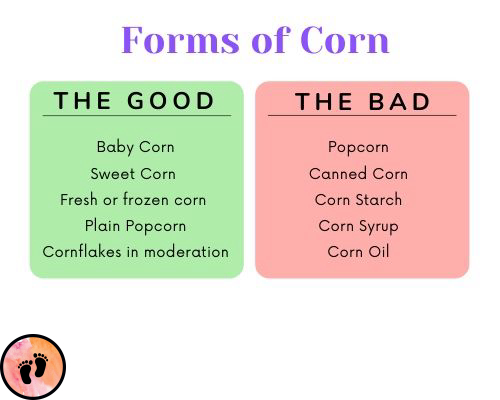 Safe and unsafe forms of corn during pregnancy
Safe and unsafe forms of corn during pregnancyCAN HAVE:
- Baby Corn - Healthy and nutritious
- Sweet Corn (Boiled Corn cob or corn kernels)
- Fresh or frozen corn cob
- Plain Popcorn with moderate butter and salt - rich in fiber
- Cornflakes in moderation
AVOID:
- Popcorn with Butter, salt or sugar (contains sodium and transfat)
- Canned Corn (risk of BPA)
- Corn Starch (only carbohydrates)
- Corn Syrup (high in sugars)
- Corn Oil (high in fat and calories)
How much corn is safe to consume?
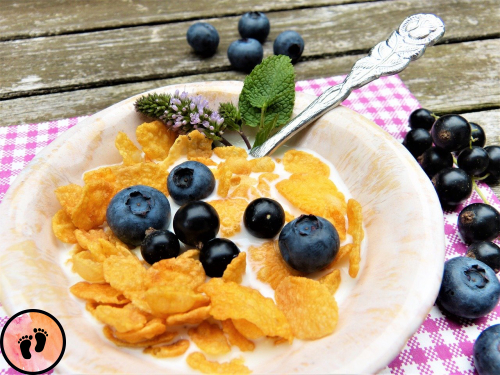 Corn in pregnancy - Glycemic index of cornflakes is higher than corn
Corn in pregnancy - Glycemic index of cornflakes is higher than corn Corn, since available in various forms, need different consumption recommendation during pregnancy.
- Corn as sweet corn is very nutritious and can be consumed safely during pregnancy upto 3 to 4 cups. The glycemic index of corn is 52 which falls under medium range
- Cornstarch contains only carbohydrates. It is not advisable to consume cornstarch regularly. During pregnancy, you need large amounts of vitamins, minerals and protein to get over the line, and when you eat cornstarch, all you get is carbohydrates which will decrease your appetite. Hence it is best to avoid during pregnancy.
- Cornflakes have a high glycemic index 81. It means the release of glucose into bloodstream is faster. In women who are obese, the risks of abnormality get quadrupled by eating high – GI diet. You require only about 1800-2400 calories per day during pregnancy. Cornflakes should contribute to maximum of only 350 which is equivalents to 2-3 cups (55-85 grams)
- Popcorn is healthy and fiber-rich but avoid over-consuming as these are high in salt content and trans fat. 1 medium size cup once in a while can still be good.
Precautions while buying and storing Corn
By following certain precautions while buying, storing and using corn, one can make sure to gain more benefits from consuming corn during pregnancy.
- Make sure to buy fresh corn with husk. You can check the freshness by piercing the kernel.
- Make sure the husk is green while buying.
- While storing the cob, make sure that the husk is intact to preserve the freshness.
- While storing the corn seeds or kernels, make sure it is stored in freezer.
- Prefer fresh or frozen sweet corn over canned corn.
- While using corn for cooking, it is always best to use fresh corn.
Corn Recipes
You can introduce corn in your diet in various forms
1. Corn Soup
2. Sweet corn or baby corn in salad, sandwiches, rice or pasta

3. Cornflakes
4. Eat corn on cob directly by boiling, grilling or barbecuing
References
Recent Posts
Homemade Pregnancy Test
How to Prevent Pregnancy Stretch Marks
Is It Safe to Eat Ice Cream During Pregnancy
Breast Pain in Pregnancy
7 Tips to getting pregnant faster
COMMON INFECTIONS DURING PREGNANCY
Pregnancy Diet: Apples during Pregnancy
Advertisement
Duis leo. Donec orci lectus, aliquam ut, faucibus non
Join Our Community of Expecting Parents Today!
Subscribe to get updated on latest and relevant pregnancy-related details